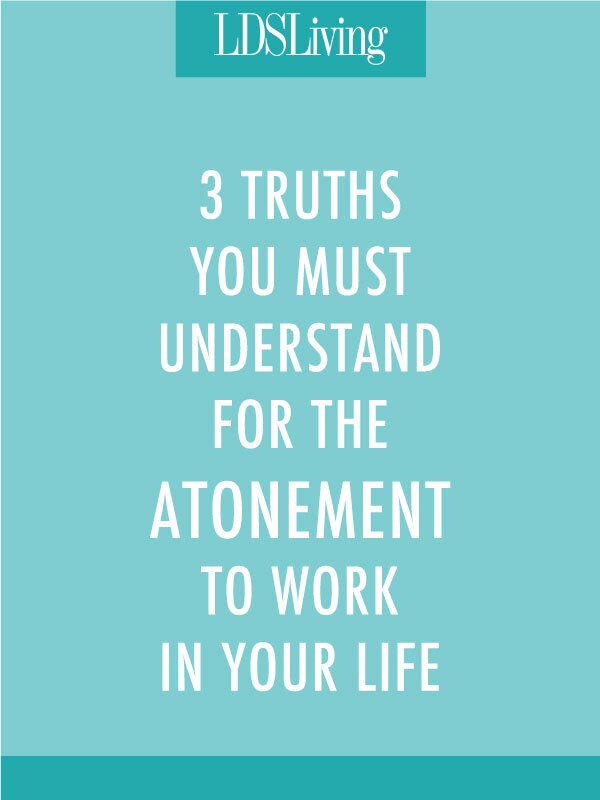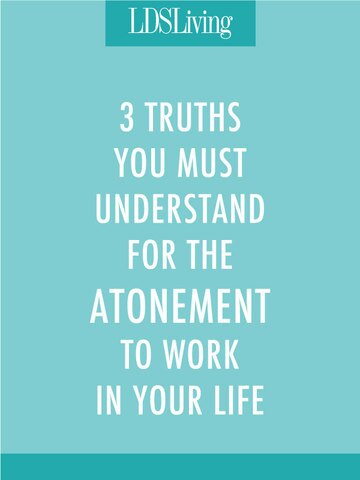
The following is an excerpt from Anthony Sweat's recently released book, Christ in Every Hour.
Once while teaching a class I wanted to help my students understand their everyday, fallen need for Jesus. “We all have sins,” I told my class, and beginning with myself I then started pointing to each of them, saying, “You are a sinner, and so are you, and so are you, and you,” going up and down the rows. Some students didn’t listen, others smiled and laughed, and a few shot back disapproving glares of “How judgmental!” with their eyes. I then came to one of the purest, most Christlike students I have ever taught, and, poking a little fun—because, like biblical Ruth, all knew of her virtue—I said, “Even you, Hillary, are a sinner.” The class laughed at the seeming incongruity of my claim. I smiled at my own lame sarcasm. And then Hillary dropped her head and sincerely said, “I know I am. . . . I know.” At that moment she taught the rest of us Pharisees in the room a profound lesson:
“And he spake this parable unto certain which trusted in themselves that they were righteous, and despised others: Two men went up into the temple to pray; the one a Pharisee, and the other a publican. The Pharisee stood and prayed thus with himself, God, I thank thee, that I am not as other men are, extortioners, unjust, adulterers, or even as this publican. I fast twice in the week, I give tithes of all that I possess. And the publican, standing afar off, would not lift up so much as his eyes unto heaven, but smote upon his breast, saying, God be merciful to me a sinner. I tell you, this man went down to his house justified rather than the other: for every one that exalteth himself shall be abased; and he that humbleth himself shall be exalted” (Luke 18:9–14).
Being tempted to not closely apply this foundational power of cleansing might say something indicting about ourselves. Those who think they have no sin or don’t have a real need to repent may be the ones most in need of cleansing. “If we say that we have no sin, we deceive ourselves, and the truth is not in us” (1 John 1:8). With more than a little sarcasm, Jesus taught a group of murmuring legalist Jews that “joy shall be in heaven over one sinner that repenteth, more than over ninety and nine just persons, which need no repentance” (Luke 15:7).
Perhaps some of those who heard him or who have read that verse missed the message, even today: There aren’t ninety-nine people who need no repentance. We all do. There are only people who think they have no need for repentance. Christian author John MacArthur wrote: "This is the theme of the gospel according to Jesus: He came to call sinners to repentance. . . . Those who think they are good enough—those who do not understand the seriousness of sin—cannot respond to the gospel. . . The unmistakable message is that Christ’s gracious call to salvation is not extended to those who view themselves as righteous." Only when we become clearly conscious of our everyday weakness do we become clearly conscious of our everyday need for Christ (see Ether 12:27). To become one with Jesus, we must first realize we aren’t part of the ninety and nine.
On the other end of the spectrum, however, there are those of us who think we are so spiritually flawed that we cannot ever stand fully approved before God. We are more than conscious of our abundant sinfulness to the point of utter hopelessness. We think our sins and shortcomings are too serious and/or occur too frequently. The adversary can lead such a person away from Christ with his deceitful whisperings: “God is displeased with your constant faults. He’s frustrated with you. He’s given you too many chances and you keep failing. You know better, but look at how weak you are! God’s not going to forgive you. Not for that. Not again. You should be better by now. The road back is too far, too long, too hard. If you try, you’ll fail anyway. It’s time to give up.”
► You'll also like: How to Conquer Your "Favorite Sins" for Good
Those words may be an over exaggeration for some, but for others, sadly, they are not. Those words actually understate the terrible mutterings of the evil one, who tries to crush the souls of all he can. To the disciples who may have lost hope—either because of serious sin or repeated sins, or both—the Lord’s comprehensive and continual cleansing power can overshadow those dark thoughts with the light of his love. The scriptures repeatedly attest of our Lord’s divine power and disposition to cleanse us freely, frequently, and fully.
There is a great gospel tension here: we must be clearly conscious of our own daily shortcomings and need for repentance, but be completely confident in Christ’s divine ability to daily cleanse us of those very weaknesses. Both elements are absolutely critical to availing ourselves of Christ’s continual cleansing power and of obtaining a daily hope in his salvation. The purpose of this article is for both the apparent saint and sinner (and everyone in between) to understand our daily need for the cleansing power of Christ and how to attain and continually retain that holy power. To do so we must first understand something fundamental about our dear Lord’s divine cleansing character.
Christ Freely Forgives Our Sins
From the moment Jesus was born, his ministry was centered on his unique spiritual cleansing power. Jesus’s very name says as much. To Christ’s earthly father, Joseph, an angel told him: “Thou shalt call his name JESUS: for he shall save his people from their sins” (Matthew 1:21). The very first recorded word Jesus ever preached in public was “repent” (Matthew 4:17). The Lord lovingly reminds all of us in our weakness and sin, “My bowels are filled with compassion towards [you]” (D&C 101:9). Micah informs us that the Lord “delighteth in mercy” (Micah 7:18) or, as Elder Jeffrey R. Holland of the Quorum of the Twelve Apostles has said, “The thing God enjoys most about being God is the thrill of being merciful.”
As such, Jesus “frankly forgave” all who sincerely sought forgiveness (Luke 7:42). Clearly repentance was (and is) required, but upon a commitment to forsake sin, Christ forgives liberally, generously, and without restraint. This is one reason why Jesus attracted the spiritual outcasts of society: publicans, women of questionable morality, thieves, zealots, and the like (see Luke 15:1). Although Jesus’s followers and disciples were a catalog of commandment breakers, there was something inviting in the Lord’s nature that made them want to be near him. A cleansing power emanated from him that caused the spiritually impure who longed for purity to be drawn to him.
As I read the Lord’s modern scriptural voice in the Doctrine and Covenants, I often find myself surprised how repeatedly and quickly—even unexpectedly—the Lord grants forgiveness. Regardless of the revelatory topic, the Savior often inserts a merciful “thy sins are forgiven.” A revelation on the last days and millennium? It begins with “your sins are forgiven you” (D&C 29:3). The elders want to know which way to travel on a journey? “Your sins are forgiven you” (D&C 60:7). Establishing the First Presidency? “Their sins are forgiven them” (D&C 90:6). It is estimated that “on more than 20 occasions in the Doctrine and Covenants, the Lord told those to whom He was speaking, ‘Thy sins are forgiven thee, or similar words.” Talk about a freely forgiving nature!
Christ Frequently Forgives Our Sins
When Jesus detects a contrite and repentant heart, the Lord’s cleansing power is not just given freely, it is also given frequently. Jesus’s answer to Peter about how often we should forgive people was actually an insight into the Lord’s own character: I am confident we could accurately rephrase the question as, “Lord, how oft shall we sin against you, and you will forgive us? till seven times?” and Jesus would reply, “I say not unto thee, Until seven times: but, Until seventy times seven” (Matthew 18:22; see also v. 21), suggesting limitless forgiveness. That is great news to all of us who struggle with repeated sin. Perhaps no better scriptural record exists of the Lord’s frequently forgiving nature than those related to Joseph Smith. Surprising as it may seem to some, the Lord repeatedly forgave the Prophet of the Restoration—for matters both large and small. The Prophet was conscious of his personal shortcomings, as was the Lord, who lovingly said of his young servant, “In weakness have I blessed him” (D&C 35:17). His repeated forgiveness began in the Sacred Grove, when the first message of the First Vision was not apostasy nor restoration nor the Book of Mormon, but forgiveness.
Joseph wrote in his 1832 account that the Lord’s first words were, “Joseph [my son] thy sins are forgiven thee.” Throughout a lifetime of subsequent revelations the Savior often repeated the first message of the First Vision to Joseph with revelations such as “at this time your sins are forgiven you” (D&C 29:3); “whose sins are now forgiven you” (D&C 61:2); and “you are clean before me” (D&C 110:5). These frequent forgivenesses to Joseph were for repeated common sins, such as succumbing to negative peer pressure, and also for large-scale sins, such as losing the 116 manuscript pages of the Book of Lehi. Frequent mistakes, frequent repentance, and frequent forgiveness tells us something about Joseph Smith’s growth as a prophet but more importantly about our Lord’s frequently forgiving nature.
King Benjamin said that as we come to know the Savior we awaken to “the goodness of God . . . and his patience, and his long-suffering toward the children of men” (Mosiah 4:6). Long-suffering could be translated as “consistently unwearied.” Jesus never tires of our repeated efforts to grow and progress. The Lord is consistently unwearied as we faithfully battle to rid our problems of dishonesty, anger, pride, immorality, selfishness, addictions, and the like. He knows that the spirit is willing, but our flesh is yet weak. He is a patient parent who champions, encourages, and also corrects his spiritually young children as they learn to control their physical and spiritual faculties. To those of us who repeatedly stumble as we strive to learn to walk as Christ did, the scriptures are clear that the Lord is there, consistently unwearied, to pick us up and encourage us to try again and again and again. “Yea, and as often as my people repent will I forgive them their trespasses against me” (Mosiah 26:30; emphasis added).
Christ Fully Forgives Our Sins
Although the Lord freely and frequently forgives sins, some of us worry whether—or don’t believe that—Christ will fully forgive our sins. Too many mistakenly view a repentant sinner like a banged-up used car, imagining there is some celestial Carfax report that always keeps a black mark by our name once we have been dinged and damaged through sin. We may go through the Creator’s body shop and get a dent removed or our paint touched up and interior detailed, but we erringly think the history always remains. Saint Peter might, before hemetaphorically buys us for service in the Lord’s kingdom, say, “Oh, I see. You want to stand fully approved by God? Yes, yes. You’re doing well now, but I see here you’ve had two different owners in the past. Someone who’s gone through multiple marriages like that just . . . Well, you know, if you hadn’t had that divorce we would look much more closely at making use of you . . .”
“Seems here like there’s been some smoke in this one. I mean, you can’t ever really get that stuff out, can you? Just kind of sticks.
We can only have people that have been smoke- and drug-free in our fleet. . .”
Yes, yes, you’re running great now. Loving God with all your heart, might, mind, and strength and your neighbor as yourself on all cylinders. But it looks like there in 2008 you had your engine replaced because of a pornography blockage. Hmm. Don’t know if we can approve of a servant with a history like that . . .”
This sort of tainted-goods thinking is inconsistent with the Lord’s promise of full forgiveness and complete cleansing from sin. Nearly all scripture-reading people are familiar with Isaiah’s beautiful language describing the thoroughness of Christ’s cleansing power: “Though your sins be as scarlet, they shall be as white as snow; though they be red like crimson, they shall be as wool” (Isaiah 1:18). Anyone who has worked to get blood out of a white shirt or grape juice from a light carpet can appreciate the depth of this metaphor. If we believe Christ, we trust that there is no partial pardon with the Lord. He completely honors his exonerations.
“There is no black mark on our right ankle that says ‘2008 sin' or brown stain behind our left ear that says ‘2010 trespass,’” Elder Tad R. Callister wrote, because of “the comprehensive cleansing power of the Atonement.” Jesus’s cleansing power is so comprehensive it causes celestial amnesia, being forgotten forever by the God who knows all. “Behold, he who has repented of his sins, the same is forgiven, and I, the Lord, remember them no more” (D&C 58:42). Because of Christ, there is no sin that cannot be everlastingly erased, fully forgiven, and completely cleansed. It’s in his cleansing nature and character to do so freely, frequently, and fully.
For more about using the Atonement of Christ in our lives, check out Christ in Every Hour by Anthony Sweat, available now at Deseret Book or deseretbook.com.




